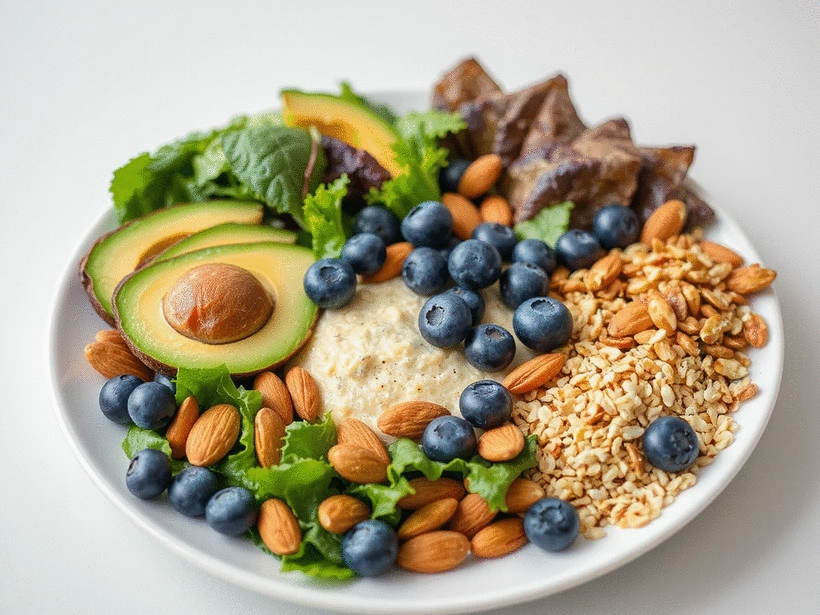Foods for Stable Blood Sugar

What if the secret to managing diabetes lies in your plate? The foods you choose can significantly impact your blood sugar levels, influencing your overall health and energy. Let’s explore the essential dietary insights that can empower your journey toward better health.
What You Will Learn
- Diet is a critical factor in managing blood sugar levels, alongside medication.
- Stable blood sugar levels enhance energy, mood, and overall health.
- Foods rich in fiber, healthy fats, and protein are best for blood sugar control.
- Consulting healthcare professionals can tailor dietary advice to individual needs.
- Incorporating small, sustainable dietary changes can lead to significant health improvements.
- Online resources and support groups can offer continued education and encouragement.
Key Dietary Components for Stable Blood Sugar
Understanding the impact of different food types on blood sugar is crucial for effective diabetes management.
Fiber-Rich Foods
Benefit: Slows glucose absorption.
Examples: Whole grains, legumes, vegetables.
Healthy Fats
Benefit: Enhance satiety, stabilize blood sugar.
Examples: Avocados, nuts, seafood.
Proteins (Lean Sources)
Benefit: Curb hunger, maintain blood sugar.
Examples: Lean meats, fish, legumes.
Non-Starchy Vegetables
Benefit: Low carb, rich in vitamins.
Examples: Leafy greens, broccoli, bell peppers.
Understanding the Importance of Diet in Blood Sugar Management
Managing diabetes is not just about medication; diet plays a crucial role in maintaining blood sugar levels. Understanding the impact of various foods on our health can empower individuals to make informed choices that contribute to their overall well-being. When we consume food, our bodies convert it into glucose, which fuels our energy needs. However, for those living with diabetes, the regulation of blood sugar levels becomes essential for avoiding complications and leading a vibrant life.
Blood sugar levels that are consistently high or low can lead to a myriad of health issues, including cardiovascular problems, nerve damage, and kidney difficulties. This is why understanding how diet affects blood sugar is so vital. I’ve seen firsthand in my practice how patients who adopt a balanced diet experience fewer fluctuations in their blood sugar, leading to better health outcomes and improved quality of life. For further insights into how dietary patterns can impact glucose regulation, consider reviewing research on nutritional approaches to glucose homeostasis.
How Blood Sugar Levels Affect Overall Health
Blood sugar levels act as a barometer for overall health. When we eat, glucose enters the bloodstream, and our bodies respond by producing insulin. Inconsistent blood sugar levels can lead to fatigue, mood swings, and increased thirst. Over time, these fluctuations can cause serious health complications. That’s why it’s important to keep blood sugar levels stable, which can be achieved through mindful dietary choices.
- Stable blood sugar helps maintain energy levels throughout the day.
- Consistent levels reduce the risk of serious health complications.
- A balanced diet can improve mood and overall mental health.
By focusing on foods that promote stability, individuals can enjoy improved health and well-being. This connection between diet and blood sugar management is what drives my mission at What Is Diabetes. We believe that informed choices lead to healthier lives!
The Role of Foods in Stabilizing Blood Sugar
Not all foods are created equal when it comes to maintaining blood sugar levels. Certain foods can help keep those levels steady, while others can cause rapid spikes and crashes. Foods rich in fiber, healthy fats, and protein tend to be the best options for blood sugar control. By incorporating these foods into your diet, you can better manage your diabetes and improve your overall health. The right dietary choices can significantly aid in controlling blood glucose levels.
- Fiber-rich foods such as whole grains, legumes, and vegetables slow down glucose absorption.
- Healthy fats from sources like avocados and nuts can enhance satiety and stabilize blood sugar.
- Proteins, particularly lean sources, help maintain blood sugar levels by curbing hunger.
As we explore diabetes-friendly foods throughout this article, keep in mind how they can impact your blood sugar levels. At What Is Diabetes, I aim to provide you with the knowledge you need to make these choices confidently and effectively.
Interactive Poll
How do you currently manage your blood sugar levels? Share your approach with us!
Frequently Asked Questions About Diabetes and Diet
Q1: Why is diet so important in managing diabetes?
A1: Diet plays a crucial role in managing diabetes by directly impacting blood sugar levels. Making informed food choices can help stabilize glucose, prevent complications, and improve overall health and energy.
Q2: What types of foods are best for stabilizing blood sugar?
A2: Foods rich in fiber (e.g., whole grains, legumes, vegetables), healthy fats (e.g., avocados, nuts, seafood), and lean proteins (e.g., lean meats, fish, legumes) are best for blood sugar control. Non-starchy vegetables are also highly beneficial due to their low carbohydrate content and high nutrient density.
Q3: How do fiber-rich foods help manage blood sugar?
A3: Fiber-rich foods slow down the absorption of glucose into the bloodstream, which helps prevent rapid spikes in blood sugar levels and promotes a more steady release of energy.
Q4: Is it necessary to consult a healthcare professional for dietary advice?
A4: Yes, it is highly recommended to consult with healthcare professionals, such as registered dietitians or your primary care physician. They can provide personalized dietary guidance tailored to your specific needs, diabetes type, and lifestyle.
Q5: What are some sustainable ways to incorporate dietary changes?
A5: Start with small, gradual changes, such as adding one or two diabetes-friendly foods to your meals each week, experimenting with new healthy recipes, and focusing on appropriate portion sizes. Gradual changes are easier to maintain long-term.
Key Takeaways for Managing Blood Sugar through Diet
When it comes to managing blood sugar levels, understanding the impact of your food choices is crucial. Here’s a quick recap of some diabetes-friendly foods and their benefits. Incorporating these foods into your daily meals can lead to more stable blood sugar levels and improved overall health!
- Fiber-rich foods like nuts and whole grains help regulate blood sugar levels and promote satiety.
- Berries, particularly those with a low glycemic index, provide essential nutrients without causing significant spikes in blood sugar.
- Non-starchy vegetables are low in carbohydrates and rich in vitamins and minerals, making them a great addition to any meal.
- Healthy fats from sources like seafood and legumes support insulin sensitivity and provide essential nutrients.
By focusing on these key food groups, you can make informed choices that contribute to better blood sugar management. Remember, small changes can lead to significant improvements in your health journey!
The Importance of Consulting with Healthcare Professionals
While it’s exciting to learn about these beneficial foods, it’s important to remember that each individual's needs may vary. Consulting with healthcare professionals, such as registered dietitians or your primary care physician, can provide personalized guidance tailored to your specific circumstances. They can help you create a diabetes diet plan that works for you.
Healthcare professionals can help you:
- Understand your unique nutritional needs based on your diabetes type.
- Develop a personalized meal plan that incorporates your preferences and lifestyle.
- Monitor your blood sugar levels to assess how different foods affect you.
Don’t hesitate to reach out for support; it’s a vital part of your diabetes management journey. Having an expert in your corner can empower you to make the best choices for your health!
Encouraging Lifestyle Changes for Better Blood Sugar Control
Making Sustainable Dietary Choices
Creating lasting change in your diet doesn't have to be overwhelming! At What Is Diabetes, I encourage you to start with small, sustainable shifts. Here are some tips that have worked for others:
- Incorporate one or two diabetes-friendly foods into your meals each week.
- Experiment with new recipes that feature fiber-rich ingredients and healthy fats.
- Focus on portion sizes to ensure balanced meals that don’t overwhelm your blood sugar levels.
By making gradual changes, you’ll find it easier to stick to your dietary goals and improve your overall health!
Resources for Ongoing Support and Information
Staying informed and connected is key to managing diabetes effectively. Here are some valuable resources you can utilize:
- Online forums and support groups where you can share experiences and tips with others living with diabetes.
- Nutrition workshops offered by local health organizations or community centers.
- Webinars and online courses from trusted health professionals that offer in-depth information about diabetes management.
At What Is Diabetes, we provide a wealth of resources to help you on your journey. Remember, you’re not alone—there are plenty of tools available to support your health!
Recap of Key Points
Here is a quick recap of the important points discussed in the article:
- Diet is crucial for managing blood sugar levels alongside medication.
- Stable blood sugar contributes to better energy levels, mood, and overall health.
- Incorporate fiber, healthy fats, and proteins into your diet to stabilize blood sugar levels.
- Consult healthcare professionals for personalized dietary guidance tailored to your needs.
- Make sustainable dietary changes by gradually incorporating diabetes-friendly foods into your meals.









